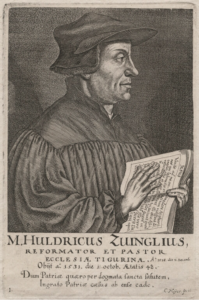A Healing Hymn from the Reformation
Rev. Tony Cooke


Ulrich Zwingli (1484-1531) and the twin towers of the Grossmünster, where he pastored in Zurich.
Ulrich Zwingli was a key leader in the Protestant Reformation. He led the Swiss Reformation from Zurich while Martin Luther spearheaded the effort in Germany. Though not as famous as Luther, Zwingli nevertheless played a major role in the blossoming movement.
When the Black Death came to Zurich in 1519, Zwingli was away resting, but when he learned of the crisis, he rushed back to help care for the people. He himself was then stricken with the pestilence and became seriously ill. Thirty percent of Zurich’s population perished during this particular plague, but Zwingli recovered and gave God the glory.
Below are excerpts of his renowned “Plague Hymn.” In other parts of the hymn, he expressed his willingness to face death, and acknowledged he would pass from this life at some future point in time. However, in the stanzas below, he simply yet powerfully describes how sick he was and how God victoriously raised him up.
Death is at hand.
My senses fail.
My tongue is dumb;
Now, Christ, prevail.
Lo! Satan strains
To snatch his prey;
I feel his grasp;
Must I give way?
He harms me not,
I fear no loss,
For here I lie
Beneath thy cross.
My God! My Lord!
Healed by thy hand.
Upon the earth
Once more I stand.
Zwingli’s counterpart in Germany, Martin Luther, wrote of God’s healing power as well. The following is from my book, Miracles and the Supernatural through Church History. (active link to https://tonycooke.org/product-category/books/)
As a pastor Luther was often moved with compassion and faith to pray for people to be healed and to recover. In one instance, Luther visited a woman who had long suffered severe seizures. Table Talk records, “Luther sighed and said: ‘God rebuke thee, Satan, and commend thee that thou suffer this, his divine creature to be at peace.’” After further prayer, it is noted, “The night following she took rest, and the next day was graciously delivered from her disease and sickness.”
In one case, Luther writes to a pastor in a nearby town and shares the advice on how to minister to a man in his congregation who was suffering from what Luther said was “not a case of ordinary melancholy.” He tells the pastor:
This must be counteracted by the power of Christ and with the prayer of faith. This is what we do—and we have been accustomed to it, for a cabinet maker here was similarly afflicted with madness, and we cured him by prayer in Christ’s name.
In addition, powerful testimonies remain of the dramatic and remarkable healing of two of Luther’s associates, Philip Melanchthon and Friedrich Myconius, both of whom were gravely ill when Luther prayed for their recoveries.

